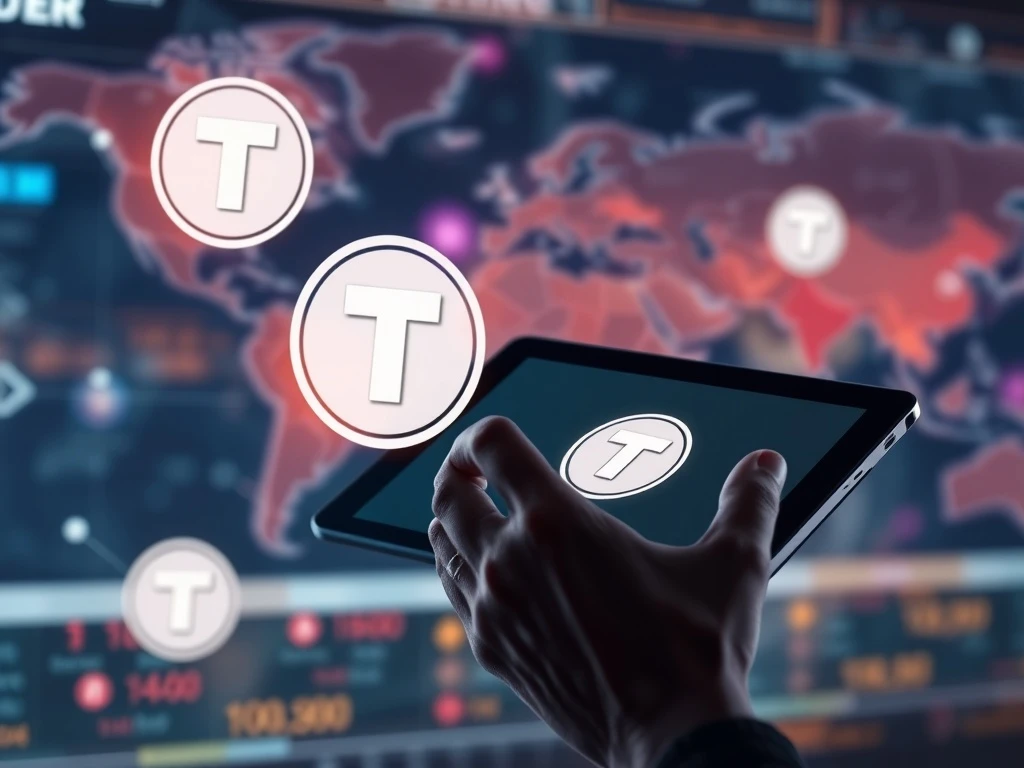Revolutionary No-KYC USDT Casinos: Unlocking Unprecedented Privacy and Speed in 2025

Are you ready for a seismic shift in the world of online gambling? In 2025, the landscape is being dramatically reshaped by the emergence and rapid expansion of No-KYC USDT casinos. These platforms are not just an alternative; they are becoming the preferred choice for many seeking a blend of anonymity, lightning-fast transactions, and unparalleled accessibility in their online betting experience. Forget the traditional hurdles of identity verification and slow payouts – the future of online gambling is here, powered by stablecoins like USDT.
The Ascent of No-KYC USDT Casinos: Why Now?
The rise of No-KYC USDT casinos in 2025 marks a pivotal moment, redefining how players interact with online gambling. These platforms offer a compelling blend of benefits that directly address common pain points in traditional systems. Here’s why they’re gaining such traction:
Unmatched Privacy: In an age where data privacy is paramount, No-KYC casinos stand out by eliminating the need for extensive identity verification. Users can gamble discreetly, maintaining their anonymity without sharing sensitive personal documents.
Blazing Speed: Say goodbye to lengthy waiting times for deposits and withdrawals. Transactions facilitated by Tether (USDT) are near-instant, allowing players to fund their accounts and cash out winnings with unprecedented efficiency.
Global Accessibility: These platforms cater to a worldwide audience, transcending geographical boundaries and offering access to online gambling services in regions where traditional options might be restricted or heavily regulated, such as New York, where frameworks for real-money online gambling are still evolving.
Lower Fees: Leveraging blockchain technology, USDT transactions typically incur lower fees compared to traditional banking methods, maximizing value for players.
Leading the Charge: Key Players in the No-KYC USDT Gambling Arena
Several platforms have emerged as frontrunners in the No-KYC USDT gambling space, each bringing unique strengths to the table. These innovators are setting the standard for what a modern crypto casino can offer:
Dexsport: This platform distinguishes itself with a truly decentralized betting model. Offering an extensive selection of over 10,000 games and a robust sportsbook, Dexsport champions a no-KYC policy and supports multiple cryptocurrencies, providing a truly versatile experience.
Mega Dice: Combining comprehensive casino games with sports betting, Mega Dice enhances user engagement through NFT rewards and seamless WalletConnect integration, ensuring smooth cross-device access.
Betplay: For players who prioritize speed above all else, Betplay delivers. It emphasizes rapid payouts and a streamlined experience, making it a favorite for poker and casino enthusiasts seeking efficiency.
Lucky Block: Targeting esports and live casino fans, Lucky Block offers low deposit thresholds and dynamic bonuses, making it accessible and rewarding for a wide range of players.
BetPanda: With a strong focus on crypto privacy, BetPanda provides a secure environment for high-RTP slots and offers attractive weekly cashback incentives, appealing to those who value discretion and continuous rewards.
The USDT Advantage: Stability in the Volatile Crypto World
One of the core reasons for the success of these platforms is their integration of USDT. Tether, a stablecoin pegged to the US dollar, plays a crucial role in mitigating the volatility risks often associated with other cryptocurrencies. This stability is vital for gambling activities, providing players with a predictable and reliable medium for their wagers and winnings. The ability to transact with a stable asset like USDT significantly enhances the user experience, making USDT gambling a more attractive and less risky proposition than using highly volatile digital assets.
Navigating the Regulatory Maze: Challenges for Online Casino Regulation
While the growth of No-KYC USDT casinos is undeniable, it’s not without its complexities, particularly concerning online casino regulation. The very features that make these platforms appealing—anonymity and global reach—also raise significant concerns for regulators. The absence of localized regulation, especially in markets like New York, presents several challenges:
Consumer Protection: Without clear regulatory oversight, questions arise about dispute resolution, responsible gambling measures, and protection against predatory practices.
Anti-Money Laundering (AML) Compliance: The decentralized nature of crypto transactions and the lack of identity verification complicate AML efforts, potentially making these platforms susceptible to illicit financial activities.
Fraud Exposure: The anonymity, while a benefit for users, can also increase the risk of fraud, necessitating robust internal security measures and industry self-regulation.
Many of these platforms operate under offshore licenses, such as Curacao eGaming, and employ robust security measures like SSL encryption and provably fair mechanisms. However, the reliance on offshore licensing may deter players who prioritize domestic oversight and regulatory recourse.
The Future Landscape: Innovation vs. Compliance in Decentralized Betting
The 2025 landscape vividly illustrates the ongoing tension between technological innovation and regulatory compliance within the decentralized betting space. For users, these platforms offer a workaround to existing regulatory gaps, providing access to offshore sites that readily accept USDT. However, for lawmakers, the challenge is to create frameworks that address oversight gaps without stifling technological advancement. In New York, for instance, proposed bills to legalize online casinos (like Senate Bill S2614 in 2025) have stalled due to political debates over economic impacts and social responsibility.
Analysts suggest that the trajectory of this sector will heavily depend on achieving regulatory clarity. If states adopt flexible and forward-thinking crypto policies, the growth potential for No-KYC USDT casinos could be immense. The industry is at a crossroads, where user demand for privacy and convenience must be balanced with the regulatory demands for accountability and consumer protection. The interplay between these forces will undoubtedly shape the future of online gambling.
Conclusion: A New Era for Online Gambling
The expansion of No-KYC USDT casinos in 2025 signifies a powerful evolution in the online gambling industry. By prioritizing privacy, speed, and accessibility through the strategic use of stablecoins, these platforms are not just meeting current user demands but are actively shaping future expectations. While regulatory challenges persist, the innovation driven by these platforms highlights a clear path towards a more discreet, efficient, and globally accessible online betting experience. As the industry matures, the ongoing dialogue between technological pioneers and regulatory bodies will be crucial in building a sustainable and secure environment for this exciting new frontier in digital entertainment.
Frequently Asked Questions (FAQs)
Q1: What exactly does ‘No-KYC’ mean for an online casino?
A1: ‘No-KYC’ (Know Your Customer) means that the online casino does not require users to submit personal identification documents, such as government IDs or utility bills, to verify their identity. This allows for a more anonymous and private gambling experience, as users can sign up and play without revealing sensitive personal information.
Q2: Why is USDT (Tether) a popular choice for No-KYC casinos?
A2: USDT is a stablecoin pegged to the US dollar, which means its value remains relatively stable compared to more volatile cryptocurrencies like Bitcoin or Ethereum. This stability is crucial for gambling, as it reduces the risk of value fluctuations impacting winnings or deposits. Additionally, USDT transactions are fast and typically have lower fees than traditional banking methods, enhancing the overall user experience.
Q3: Are No-KYC USDT casinos legal?
A3: The legality of No-KYC USDT casinos varies significantly by jurisdiction. Many operate under offshore licenses (e.g., Curacao eGaming) and are not regulated in every country. While they may be accessible globally, users should be aware of their local laws regarding online gambling and cryptocurrency. In some regions, using such platforms might be considered operating in a regulatory gray area.
Q4: What are the main risks associated with using No-KYC crypto casinos?
A4: While offering benefits like privacy and speed, No-KYC crypto casinos come with risks. These include potential for limited consumer protection due to less stringent regulation, increased exposure to fraud due to anonymity, and challenges in dispute resolution. Users should choose reputable platforms with strong security features and provably fair systems.
Q5: How do these platforms ensure fairness without traditional oversight?
A5: Many No-KYC crypto casinos utilize ‘provably fair’ technology, which uses cryptographic algorithms to allow players to verify the fairness of each game outcome. This transparency builds trust by demonstrating that game results are random and have not been manipulated. They also often employ SSL encryption to secure user data and transactions.










